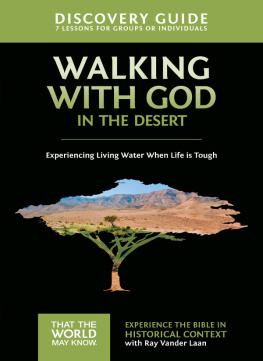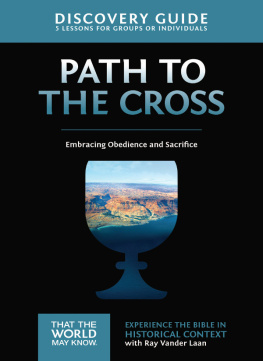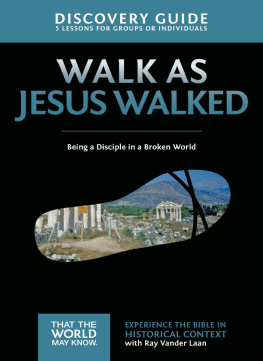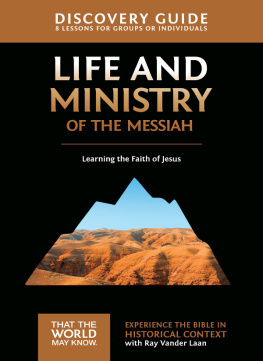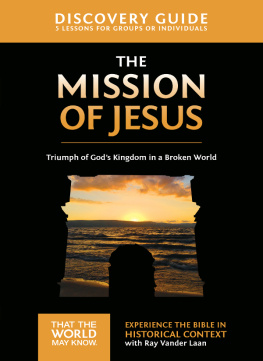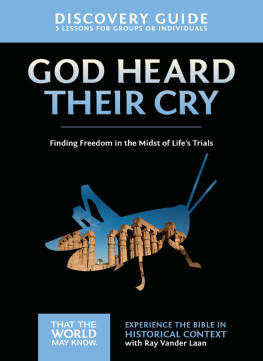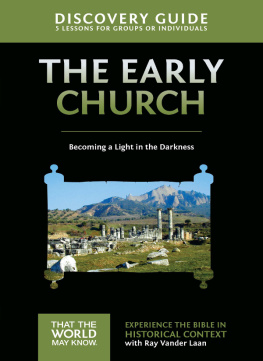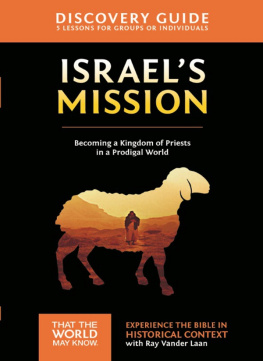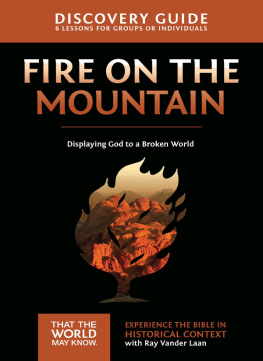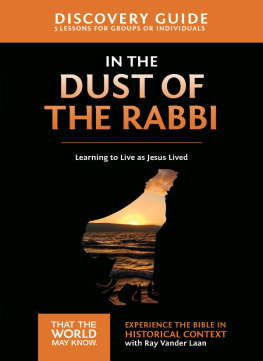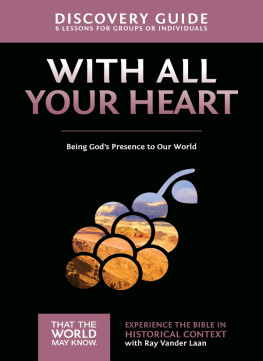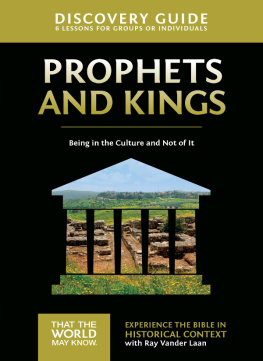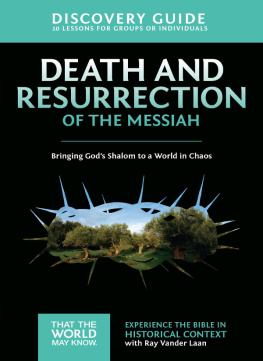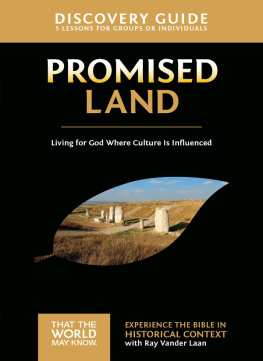That the World May Know with Ray Vander Laan
Volume 1: Promised Land
Volume 2: Prophets and Kings
Volume 3: Life and Ministry of the Messiah
Volume 4: Death and Resurrection of the Messiah
Volume 5: Early Church
Volume 6: In the Dust of the Rabbi
Volume 7: Walk as Jesus Walked
Volume 8: God Heard Their Cry
Volume 9: Fire on the Mountain
Volume 10: With All Your Heart
Volume 11: The Path to the Cross
Volume 12: Walking with God in the Desert
Volume 13: Israels Mission
ZONDERVAN
Walking with God in the Desert Discovery Guide
Copyright 2010 by Ray Vander Laan
Requests for information should be addressed to:
Zondervan, 3900 Sparks Dr. SE, Grand Rapids, Michigan 49546
Focus on the Family and the accompanying logo and design are federally registered trademarks of Focus on the Family, 8605 Explorer Drive, Colorado Springs, Colorado 80920.
That the World May Know is a trademark of Focus on the Family.
ePub Edition September 2015: ISBN 978-0-310-88063-9
All maps are created by International Mapping.
All photos are courtesy of Ray Vander Laan and Mark Tanis.
All Scripture quotations are taken from The Holy Bible, New International Version, NIV. Copyright 1973, 1978, 1984 by Biblica, Inc. Used by permission. All rights reserved worldwide.
Scripture quotations marked TNIV are taken from the Holy Bible, Todays New International Version. TNIV, copyright 2001, 2005 by Biblica, Inc. Used by permission of Zondervan. All right reserved worldwide.
Any Internet addresses (websites, blogs, etc.) and telephone numbers in this book are offered as a resource. They are not intended in any way to be or imply an endorsement by Zondervan, nor does Zondervan vouch for the content of these sites and numbers for the life of this book.
All rights reserved. No part of this publication may be reproduced, stored in a retrieval system, or transmitted in any form or by any means electronic, mechanical, photocopy, recording, or any other except for brief quotations in printed reviews, without the prior permission of the publisher.
Cover design: DoMoreGood
Cover photography: BiblePlaces.com; Getty Images
Interior design: Ben Fetterley, Denise Froehlich
CONTENTS
Ebook Instructions
In this ebook edition, please use your devices note-taking function to record your thoughts wherever you see the bracketed instructions [Your Notes] or [Your Response]. Use your devices highlighting function to record your response whenever you are asked to checkmark, circle, underline, or otherwise indicate your answer(s).
From the beginning of human history, God the Creator planned to reclaim his world from the chaos of sin. He wanted to restore shalom to his creation, and he chose to use people to accomplish this divine purpose. Through the great exodus of the Hebrews from slavery in Egypt to their home in the Promised Land, God revealed himself to his people, gave them their identity as his chosen people, and instructed them in who he wanted them to become and how he wanted them to live.
So the exodus of the Hebrew people from Egypt to the Promised Land was more than a compassionate act of divine deliverance. It was Gods calling of a people to be his treasured possession, kingdom of priests, and holy nation who would put him on display for the whole world to see (Exodus 19:4 6). God, in effect, took Israel as his bride, and lived among them through the years of discipline and testing in the desert in order to mold and shape them to be his faithful witnesses to the world.
And at the deepest level, the exodus story not only provides a background for Gods plan to bring Jesus into the world as Messiah, it is one of the first chapters in Gods great redemptive story to restore shalom unity, harmony, order to his broken creation.
For those of us who seek to live as Gods people today, it is essential that we understand these stories as more than ancient history. The ancient stories of the Bible describe God and define the faith walk of his people. Gods people come to know him by what he does, not by attempting to define him with precise doctrine. Gods people come to live the way he desires by remembering, retelling, and reliving his great redemptive acts, not by simply memorizing laws, rules, and regulations.
Despite the many failures of Gods people in fulfilling their role in that story, Gods power has and continues to flow through his flawed (Jesus excepted, of course) human instruments to bring to fruition his plan of redemption. So, like the ancient Hebrews, we need deliverance from the bondage of Egypt. We need to be amazed by Gods power at work at the Red Sea. We need to respond to his voice at Mount Sinai. As we wander through the deserts of our lives, we need to set our feet firmly on the foundation of depending on God and living by his every word. Their story is our story. As we come to know that story and partake of the redemption God offers through his Son, Jesus Christ, we too become part of that ancient story of redemption.
Thus the exodus is a paradigm for our own experience. As Christians today, we can describe our deliverance in similar language because God delivers us by his mercy and the protecting blood of the Lamb Jesus Christ. Without the exodus, we would not be who we are redeemed people delivered by the God of Israel. And without the hardships of the desert experience, we would find it difficult to learn how to live in intimate dependence on his provision and by faithful obedience to his every word.
The desert is one of the richest and most helpful images of the Bible. The beauty of the deserts of the Bible lands, the stories set there, and the people of the desert are deeply moving. Days spent in the desert are very hard. Its hot and there is no shade. The terrain is mountainous and very rugged.
Just walking through the deserts of the Middle East is difficult work. It leads desert travelers to wonder whether or not they can make it. But just when they feel they cannot go another step, God provides just enough of his presence just enough shade, just enough water, just enough help from a fellow traveler to make it through the difficult places.
In the hardship and struggle to survive in the desert, we find a metaphor for surviving the desert experiences of heart and soul the hard times of emotional, spiritual, physical, and relational pain that all of us face no matter where we live. We realize that life moves from one desert experience to another. The heat of our suffering during these times can be overwhelming. We may be weary and thirsty and find little or no refreshment. And yet, God is with us. He is our provider and our protector, and he will give us just enough. While no one looks forward to the desert experiences of life, knowing that in the heat of those desperate times God will provide just enough is hope enough to live significant and purpose-filled lives.
Clarifying Our Terminology
In this study, the record of Gods reclaiming and restoring his broken world is called the Bible, Scripture, or the text. Having studied in the Jewish world, I believe it is important to communicate clearly how the nature of that inspired book is understood. Although it can be helpful to speak of Scripture in terms of Old and New Testaments, these descriptions also can be misleading if they are interpreted to mean old and outdated in contrast to a new replacement. Nothing, in my opinion, is further from the truth.
Whereas the New Testament describes the great advance of Gods plan with the arrival of the Messiah and the promise of his completed and continuing work, the Old Testament describes the foundational events and people through whom God began that work. The Bible is not complete without both Testaments; it comprises Gods one revelation, his one plan to reclaim his world and restore harmony between himself and humankind. To emphasize that unity, I prefer to refer to the Hebrew text (Old Testament) and the Christian text (New Testament) that together are the inspired, infallible Word of God.
Next page
